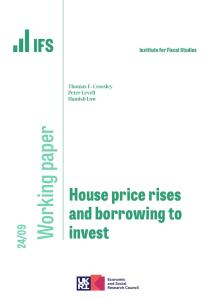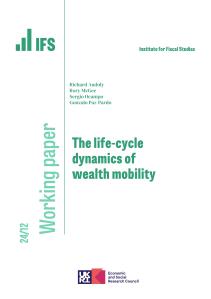We examine the possible consequences of the increasing shift from Defined Benefit to Defined Contribution arrangements for private pensions. Whilst much analysis has focused on the possible distribution of investment and job tenure risk, we point out the additional role for issues relating to adverse selection and to retirement incentives. These issues are illustrated using empirical evidence from the United Kingdom, where the fact that private pensions are an alternative, as opposed to a supplement, to earnings-related state pension provision makes the effects particularly salient.
Authors

CPP Co-Director
James is Senior Research Fellow and Professor of Economics at Manchester, working on broad issues in the economics of retirement, savings and health.

Deputy Director
Carl, a Deputy Director, is an editor of the IFS Green Budget, is expert on the UK pension system and sits on the Social Security Advisory Committee.

CPP Co-Director
Richard is Co-Director of the Centre for the Microeconomic Analysis of Public Policy (CPP) and Senior Research Fellow at IFS.
Journal article details
- DOI
- 10.1162/jeea.2005.3.2-3.466
- Publisher
- Wiley
- JEL
- I38, J32, D91
- Issue
- Volume 3, Issue 2-3, April 2005
Suggested citation
J, Banks and R, Blundell and C, Emmerson. (2005). 'The Balance Between Defined Benefit, Defined Contribution, and State Provision' 3, Issue 2-3(2005)
More from IFS
Understand this issue

Raising revenue from closing inheritance tax loopholes
18 April 2024

Spring Budget 2024: the Chancellor’s options

It's time to stamp on a tax that penalises landlords and renters
22 January 2024
Policy analysis

Pensions: five key decisions for the next government
7 June 2024

Key decisions await the pensions minister after the election
7 June 2024

Making mortgage guarantees permanent will help some first-time buyers, but only if they can afford a bigger mortgage
6 June 2024
Academic research

House price rises and borrowing to invest
27 March 2024

The intergenerational elasticity of earnings: Exploring the mechanisms
3 June 2024

The life-cycle dynamics of wealth mobility
10 April 2024